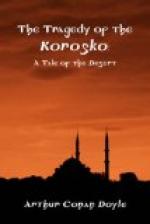“Well, Cochrane, it’s all in our favour. The longer the chase the better chance for the fresh camels!” and for the hundredth time he looked back at the long, hard skyline behind them. There was the great, empty, dun-coloured desert, but where the glint of steel or the twinkle of white helmet for which he yearned?
And soon they cleared the obstacle in their front. It spindled away into nothing, as a streak of dust would which has been blown across an empty room. It was curious to see that when it was so narrow that one could almost jump it, the Arabs would still go for many hundreds of yards rather than risk the crossing. Then, with good, hard country before them once more, the tired beasts were whipped up, and they ambled on with a double-jointed jogtrot, which set the prisoners nodding and bowing in grotesque and ludicrous misery. It was fun at first, and they smiled at each other, but soon the fun had become tragedy as the terrible camel-ache seized them by spine and waist, with its deep, dull throb, which rises gradually to a splitting agony.
“I can’t stand it, Sadie,” cried Miss Adams suddenly. “I’ve done my best. I’m going to fall.”
“No, no, auntie, you’ll break your limbs if you do. Hold up, just a little, and maybe they’ll stop.”
“Lean back, and hold your saddle behind,” said the Colonel. “There, you’ll find that will ease the strain.” He took the puggaree from his hat, and tying the ends together, he slung it over her front pommel. “Put your foot in the loop,” said he. “It will steady you like a stirrup.”
The relief was instant, so Stephens did the same for Sadie. But presently one of the weary doora camels came down with a crash, its limbs starred out as if it had split asunder, and the caravan had to come down to its old sober gait.
“Is this another belt of drift sand?” asked the Colonel presently.
“No, it’s white,” said Belmont. “Here, Mansoor, what is that in front of us?”
But the dragoman shook his head.
“I don’t know what it is, sir. I never saw the same thing before.”
Right across the desert, from north to south, there was drawn a white line, as straight and clear as if it had been slashed with chalk across a brown table. It was very thin, but it extended without a break from horizon to horizon. Tippy Tilly said something to the dragoman.
“It’s the great caravan route,” said Mansoor.
“What makes it white, then?”
“The bones.”
It seemed incredible, and yet it was true, for as they drew nearer they saw that it was indeed a beaten track across the desert, hollowed out by long usage, and so covered with bones that they gave the impression of a continuous white ribbon. Long, snouty heads were scattered everywhere, and the lines of ribs were so continuous that it looked in places like the framework of a monstrous serpent. The endless road gleamed in the sun as if it were paved with ivory. For thousands of years this had been the highway over the desert, and during all that time no animal of all those countless caravans had died there without being preserved by the dry, antiseptic air. No wonder, then, that it was hardly possible to walk down it now without treading upon their skeletons.




